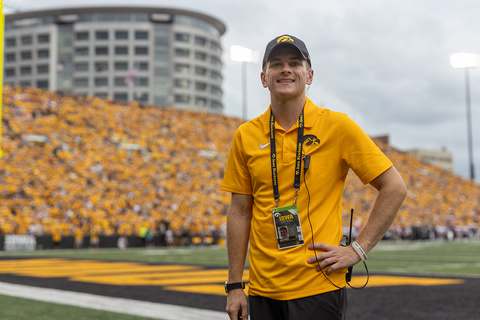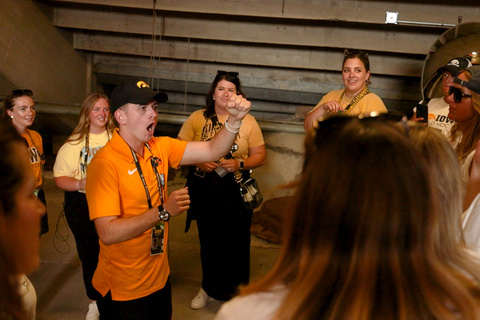With a connection to an athletics department overseeing more than 20 NCAA Division I teams, it’s no wonder that the University of Iowa’s Sport and Recreation Management program presents a plethora of opportunities for students at every level. The program offers both a Bachelor of Science as well as a Master of Arts degree in sport and recreation management. From internships to graduate assistantships, students gain hands-on experience at UI and in the community.
Hands-on experience is integral to the education Sport and Recreation Management (SRM) students receive. In the MA program, students are required to complete a minimum of three experiential learning credit hours, but many choose to complete an additional three hours. All master’s students also complete a capstone class that is experiential learning based.

“Out of a 30-credit-hour master’s program, that’s six to nine credit hours that are focused on real-world experiences where students are working with industry partners, doing internships, and getting opportunities that they’re going to be able to take with them into the job market when they graduate,” says SRM Director Dan Matheson.
Matheson has been with the program for thirteen years and was named director in 2016. Prior to joining the program, he worked for the New York Yankees and the NCAA.
The Iowa athletics department serves as a laboratory where SRM students can apply what they learn in the classroom. According to Matheson almost 45 percent of students in the master’s program are either interns or graduate assistants for the athletics department. These students help support the department in areas such as events, communications, operations, marketing, and more.
For recent graduate Lexi Tofanelli, the connection to Iowa’s athletics teams and their support for women’s sports were part of her decision to pursue her MA at Iowa. Tofanelli was a student athlete as an undergraduate, and she was excited to have the opportunity to learn more about the operational side of college athletics. Her internship in the 2023-2024 academic year was with the athletics department’s event management office.
“This was my first time having a hands-on experience in organizing and executing events,” Tofanelli says. “I found a love for event management last year. I think finding that love has helped me better understand the inner workings of an athletic department.”
When it comes to events, Tofanelli is now an expert. Through her internship she was part of the team that helped organize Crossover at Kinnick – the first women’s basketball game held inside Kinnick Stadium. She also assisted with a sold-out season for women’s basketball, witnessed the largest attendance for a women’s wrestling event in the program’s first year, and helped with all seven home football games. Her tasks included everything from coordinating with coaches to working with volunteers and printing timing sheets.
Preparing students for what’s next
For second-year MA student Holden Hudson, working with the athletics department has been an inside view into what full-time work would look like. Hudson is the marketing intern for Iowa Athletics, and this is his fourth year with the department. He started working with the department while he was in the undergraduate SRM program and has been able to build relationships with the staff throughout his four years.

“The staff with the athletic department does an amazing job of teaching you what it would be like if this was your full-time job and giving you the opportunity to live through life experiences,” Hudson says.
Hudson mainly works with football and men’s basketball. He’s been able to gain experience in writing the scripts for announcers, organizing materials and giveaways for theme nights, and working as the in-house DJ for men’s basketball.
Iowa’s athletics department isn’t the only place where students can intern. Matheson mentioned that students in the program have internships in other campus areas like Recreation Services as well as with other teams in the area like the Iowa Heartlanders. Students are also able to spend their summers working elsewhere. All of these experiences will be transferable to their future careers.
“Something I tell all students is the value of a master’s degree in sport and recreation management is what you combine outside the classroom with what you’re learning in the classroom,” Matheson says.
For Tofanelli, this proved to be true. After graduating, she was offered a full-time position with the event management office with which she had previously interned. This year, she’s working hard in her new role tackling Iowa’s slate of home football games.
Home is where the Tigerhawk is

Seeing his students succeed has been one of the most rewarding pieces of Matheson’s role. He recalls numerous examples of students sending him messages about positions they’ve received due to their internships, their connections to the program’s advisory board, and even their connections to each other.
Just this last winter, Matheson received an email from alumna Paige Snitker whose experience in the SRM program intersected with an assignment in her new role.
During her time in the SRM program, Snitker worked with Iowa Athletics in their event management office, and she witnessed basketball star Caitlin Clark’s first year as a Hawkeye. After graduating in 2020, Snitker worked full-time for Iowa Athletics before moving to a new role at IMG Academy in Florida.
Snitker later moved to professional sports in November 2022 when she started working for the National Basketball Association as a League Operations and International Communications executive. The day after the 2024 WNBA draft, Matheson received an over joyous email from Snitker that she’d been assigned as Clark’s public relations liaison during the draft – a full-circle moment from her time at UI.
Student focused, industry centered
Around 40 percent of SRM graduates continue to work in college athletics. Beyond that, graduates have also moved to roles in professional sports, sport national governing bodies, interscholastic sports, and campus and community recreation.
“We are student-focused, industry-centered,” Matherson says. “We spend an enormous amount of time mentoring our students and helping them navigate their path into a very competitive industry. We are very centered on preparing our students for leadership positions in the sport and recreation industry.”

Matheson, Tofanelli, and Hudson all agree that passion and energy are key for working in sports. Both Tofanelli and Hudson mentioned moments in their own athletics experiences that fueled their passion for the industry. For Matheson, he enjoys being able to share his passion with students.
“I would be spending my time paying attention to sports even if it wasn’t my job, but the fact that my career has always been connected to sports just makes this a natural place to be surrounded by students who are so passionate about wanting to break into that industry,” he says.
For aspiring SRM students, Hudson and Tofanelli each offer their own pieces of advice. Tofanelli encourages students to volunteer for everything they can and take advantage of every experience that is offered. Hudson recommends focusing on the smaller things to start so that bigger tasks come naturally. Both agree that the opportunities the SRM programs presents are invaluable.